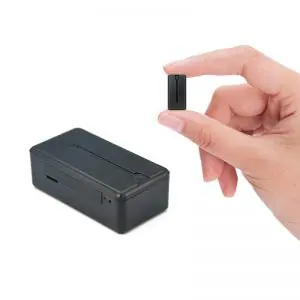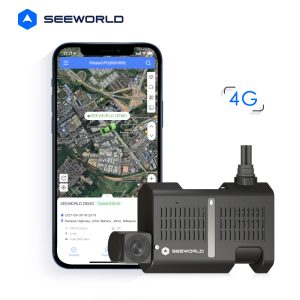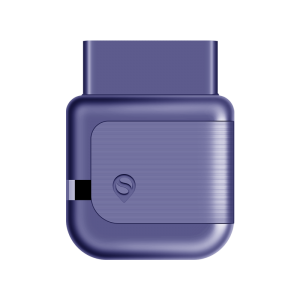You’ve probably seen the movies where a spy secretly attaches a small piece of hardware to the bottom of a vehicle or the inside of a trunk, and then the car drives away, allowing the spy to follow the car’s location.
While some other films have a quarter-sized piece of gear that does the same function. So, what’s the difference between these gadgets and the plethora of other GPS devices? Are all of these GPS tracking options effective?
And why do some need to be plugged into automobiles while others can run for months on batteries? Let’s take a look at the types of GPS trackers available and popular in the market and which GPS tracking type is best for you and your car.
Basics of GPS Tracking: What Is a GPS Tracking Device
GPS relies on a network of satellites (each of which sends out a signal) circling the Earth to determine location. The signals sent out from the satellites are received by special receivers, which are used to triangulate the position of the satellites.
We often call the device that uses the satellite network to determine its location. But if it utilizes another method, such as triangulating its position against cellular towers, it is not a GPS device technically.
However, many people use GPS as a catch-all phrase for anything that calculates location, which causes some misunderstanding.
Some individuals are also perplexed by the fact that GPS may be utilized for a variety of purposes. It is frequently used to determine directions, and this is called GPS navigation.
When a gadget shares its position with outside monitors, it is referred to as GPS tracking.
Computer networks even employ GPS to create a common clock across several devices. If a gadget receives its data from the satellite network, regardless of how it is utilized, it is a GPS device; if it does not, it is not.
GPS Trackers Types for Vehicle, Equipment, and Assets
The majority of vehicle and equipment GPS trackers are designed for cars and larger pieces of equipment like boats and trailers.
But they can still be relatively tiny, frequently less than the size of a smartphone. And many of them get power from the automobile; they don’t require huge batteries to run (although a backup battery is a good idea).
There are three primary equipment GPS trackers offered: Plug-in, hardwired, and battery-operated GPS car trackers.
Typically, these gadgets use a cellular connection to disseminate the information they collect. Remote users can then utilize a mobile app or a secure online connection to retrieve the GPS tracking data.
We are going to talk further in the following section:
#1. Plug-In Vehicle GPS Trackers (OBD GPS Tracker)
GPS trackers that connect to a car’s port are called plug-in GPS trackers (also called OBD GPS trackers). Since the mid-1990s, all cars in the United States have been required to have an OBD II port, where mechanics plug their computer into it to obtain data from the car’s sensors.
Although the location of the OBD connection varies with every vehicle, it is commonly found beneath the steering wheel or slightly above the driver’s knees.
The plug-in GPS tracker may also get power and data through the port. Plug-in trackers (like the SEEWORLD S709 OBD tracker) are compact, easy to install, and can detect whether a vehicle is on or off. This plug-and-play feature allows you to effortlessly remove it and use it on as many vehicles as you choose.
S709 OBD tracker allows you to switch between active and sleep states (which report data less frequently to avoid draining the car battery).
It also allows them to receive notifications anytime a vehicle is started or stopped. Both personal and commercial customers will benefit from plug-in models.
CHECK THIS PRODUCT#2. Hardwired Car GPS Trackers

D11L 4-wire tracker
Hardwired vehicle GPS trackers (such as the SEEWORLD D11L real-time tracker) are connected to a car.
This hardwired GPS tracker can be used if the vehicle lacks an OBD II port (Older automobiles may not have an OBD port, and diesel trucks may utilize a separate OBD standard that isn’t compatible.)
If you are looking for a hidden car GPS tracker, this type of device would be your go-to choice. They can be hidden, but won’t have a negative impact on their functions.
They are often positioned under the dashboard because they cannot be connected to the OBD port.
However, if installed correctly, they retain all of the benefits of the plug-in tracker. A hardwired GPS device may provide more freedom to users than a plug-in type in some instances.
Business owners and fleet management companies often employ hardwired GPS trackers to track work trucks.
Moreover, in the field of personal use, a hardwired GPS unit may be the best alternative for a family who wants to track their diesel vehicle or a hybrid automobile.
CHECK THIS PRODUCT#3. Portable Battery-Powered GPS Trackers for Cars

S11 Mini GPS Tracker
The SEEWORLD S11 is a battery-operated GPS tracker that does not rely on the vehicle’s power supply. S11 trackers are powered by their long-lasting batteries. They broadcast their locations to monitors, much like any other tracking device.
S11 can be used on trailers, such as towboats or motorcycle haulers. They may be mounted on cargo containers, dumpsters, and even construction equipment.
The batteries of the S11 are quite strong and can last for months (or even years) without needing to be recharged.
CHECK THIS PRODUCT#4 Wireless GPS Tracker for Asset, Vehicles
4G wireless asset tracker – W18L
Ideal for unpowered assets such as trailers, containers, and outdoor equipment, SEEWORLD’s W18L is a rugged, IP67-rated tracker with long battery life and flexible reporting intervals. It does not require any wiring or external power supply, making it ideal for remote or temporary deployments. Its simple installation, concealed location, and low maintenance costs make it particularly useful for logistics, construction, and rental asset tracking.
#5 Dash Cam GPS Tracker

V7 PRO 4G Dual Channel Driving Dash Cam
The Dash Cam GPS Tracker combines live video recording and real-time location tracking to provide a more comprehensive view of driving events. SEEWORLD’s V7 PRO features dual 1080P cameras and 4G connectivity for instant access to footage and GPS data via a cloud platform. It is particularly effective for fleet safety, accident evidence collection, and driver behavior monitoring. This type of tracker adds visual accountability and real-time awareness to improve vehicle operational efficiency and reduce liability.
Which Types of GPS Car Trackers Should I Choose?
After learning about these GPS auto trackers, the next important issue is which one I should choose.
We are going to answer this question based on its benefits and drawbacks. However, keep in mind that the objective you have will dictate which tracker type you choose.
Pros and Cons of Plug-in (OBD) GPS Tracker
Pros of Plug-in (OBD) GPS Tracker
Installing and uninstalling is a breeze. Like we said before, this plug-and-play feature of an OBD plug-in tracker allows you to effortlessly remove it and use it on as many vehicles as you choose.
Some individuals prefer this way of connection since it is simple to set up and requires no special tools. Simply attach the GPS tracker to the OBD port.
Another benefit of an OBD GPS car tracker is its portability. Fleet management companies and other transporters make use of the plug-in GPS tracker mobility.
You may swap it between vehicles and instantly start obtaining vehicle diagnostic data because it is compact and easy to install and uninstall. It’s also cost-effective because it doesn’t require any additional attachments to work.
Once installed, metrics like fuel use may be easily monitored, allowing the driver to make rapid judgments about the quickest route to his or her destination. And this function is called “in-cab driver coaching.”
The in-cab driver coaching GPS tracker has a subtle warning system that assists in guiding the driver through various driving behaviors, such as guidance through specified drive routes to a destination, speed limit, sudden application of brakes, and quick acceleration.
Summary:
- Easy to install
- Portable
- Cost-effective and versatile
Cons of Plug-in GPS Car Tracker
Due to its form of connection and position, the OBD car tracker is visible, and it may approach too close to the foot pedals, causing some driving difficulties.
Also, keep in mind that once you disconnect, the tracker will lose whatever connection or contact it had.
The plug-in GPS tracker will be stolen easily because this plug-in GPS tracker is so simple to remove; it may be destroyed and stolen if it falls into the wrong hands. As a result, the ease of installation is not always a benefit.
Also, because of the location of the OBD connector, anyone who understands what a tracker is can easily recognize it.
If a car is hacked and the thief notices the OBD car tracker, he may simply remove it and carry out his malicious plans.
Pros and Cons of Hardwired GPS Trackers
Pros of Hardwired GPS Tracker
Hard-wired GPS car trackers, as the name indicates, are plugged directly into the vehicle’s wiring. This technique is preferred by some users, especially if their car lacks the OBD port, which is required for non-wired trackers.
We’ve noted that most new automobiles lack an OBD port, which is one of the reasons why consumers prefer the hardwired connection method.
The tracker may be hidden in any section of the car, which is a huge benefit of the hardwired connection over the OBD connection. No one will know it’s there because the cables aren’t visible, let alone where it’s being hidden.
Summary:
- Commonly used in modern cars without an OBD port
- No extra setup is required, and the tracker is hidden
Cons of Hardwired GPS Tracker
The hardwired GPS tracker can only be used for one car, unlike the OBD tracker, which can be switched among many vehicles. You wouldn’t want to spend as much time uninstalling it and installing it in another vehicle.
It is not friendly to car owners. The hardwired tracker can only be installed by a skilled technician. And even the best of them might take up to 30 to 40 minutes to install; picture doing it yourself.
Pros and Cons of Battery-powered Wireless GPS Trackers
Pros of Battery-Powered Wireless GPS Tracker
Wireless GPS trackers have built-in batteries so they can work without relying on the power of a vehicle.
These wireless trackers are waterproof, can be used outdoors, and are certified to IP67 standards. Trailers and remote equipment benefit greatly from these products.
The installation is simple. It can be mounted in any place, as long as it can observe GPS satellites and interact with the cellular network.
Cons of Portable Battery-Powered GPS Tracker
These portable wireless GPS trackers may not communicate information as frequently in order to conserve battery life. When a vehicle is operating, it sends data every minute, and when it is not, it sends data every hour.
Wireless GPS Tracker – Best for Non-Powered Assets and Easy Deployment
If you need a fully wireless, low-maintenance solution for tracking trailers, containers, or equipment without constant power, a wireless GPS tracker is the way to go.
-
Pros:
• Easy to install – no wiring required.
• Long battery life supports weeks or months of standby.
• IP67-rated protection suitable for harsh environments.
• Great for assets that move infrequently or sit idle for long periods. -
Cons:
• Typically offers scheduled tracking updates rather than real-time refresh.
• Battery replacement or recharging is required after extended use.
• Limited support for features like remote engine cut-off.
Summary:
Choose a wireless tracker like SEEWORLD’s W18L when flexibility, long standby time, and ease of use are top priorities—especially for tracking assets in the field.
Dash Cam GPS Tracker – Ideal for Driving Safety and Video Evidence
If your main goal is to monitor driving behavior, record incidents, or ensure driver accountability, a dash cam GPS tracker is your best fit.
-
Pros:
• Combines real-time GPS tracking with HD front/rear video.
• Instant alerts for speeding, collisions, or abnormal driving.
• Cloud access to video clips for fast evidence retrieval.
• Enhances fleet safety and insurance compliance. -
Cons:
• Requires constant power connection to function.
• Higher data usage due to video transmission.
• Installation is more involved than plug-and-play devices.
Summary:
For businesses or individuals seeking advanced road safety and visual accountability, the SEEWORLD V7 PRO offers a complete tracking + video monitoring solution.
Other Types of GPS Devices: Wearable GPS Trackers for Personal Use and Pet Tracking
Many GPS trackers are modest in size. Wearable trackers are one type of GPS tracker. Some fitness trackers are the size of a wristwatch.
Hikers and hunters can use them to communicate their locations in the event of an emergency. Some even feature a button that may send out a distress call and their location, generally through cellular networks.
Many wearable devices claim to be GPS devices, but they aren’t.
It is critical to understand how a tracking device obtains its position data. Some pet collars, for example, may utilize a pet GPS tracker, while others use Bluetooth.
The non-GPS tracking system, on the other hand, provides several advantages. They could, for example, make a wearable lighter. They’re also a better way to keep track of small goods.
GPS trackers indicate the position of satellites to the degree of precision of a street address. That’s OK for a car, but if you want to know where your keys are in the home, that’s not possible with a GPS device


